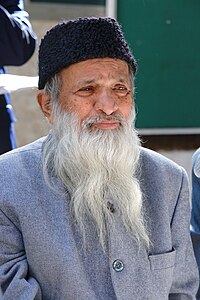Legendary Pakistani Social Worker Abdul Sattar Edhi Dies In Karachi
Abdul Sattar Edhi was one of the greatest humanists and social servants of the world, not just of Pakistan and South Asia. In a country beset with violence and sectarianism he and his co-workers held aloft the banner of humanity and rendered aid and succour to those who desperately needed it, without regard to caste, community or nationality. In his own words, "No religion is higher than humanity." It was the Edhi Foundation that took Geeta, the Indian girl who wandered across the border thirteen years ago, looked after her, and sent her home last year. The universal sorrow at his passing shows that human beings still recognise that goodness, love and compassion can override all man-made divisions and all hate-filled ideas. His last words were: Meray mulk ke
ghareebo ka khayal rakhna ("Look after my contry's poor")


Let us salute this great man and hope that his spirit will live on not only in Pakistan but in the world
Thank you for everything. Rest in peace Edhi sahib
Famed philanthropist Abdul Sattar Edhi, who
set up one of Pakistan's biggest welfare organisations and was revered as a
"living saint" by many in the South Asian country, died in hospital
late on Friday. The announcement of his death triggered a wave of accolades on
TV and social media. Pakistan's Prime Minister Nawaz Sharif paid tribute to him
as "a great servant of humanity," and said he would receive a
posthumous presidential medal and a state funeral.The 88-year-old's reputation for austerity and generosity resonated deeply in Pakistan, a country of 190 million people whose government is riddled with corruption and where public health and welfare services are weak. "There are few men who have done as much good, and made as much a difference to the lives and livelihoods of the Pakistani people as Abdul Sattar Edhi," Sharif said hours before Edhi's death.
Edhi, a short man with a long white beard who often wore a traditional cap, had been ill for several years after suffering kidney failure, Edhi's son Faisal told journalists in Karachi. Sharif's government had offered to fly Edhi abroad for treatment, but he refused, saying he wanted to be treated at a public hospital in his own country.
The Edhi Foundation runs a vast fleet of ambulances, orphanages and medical clinics across the country. Last year when a devastating heat wave struck Karachi - a city of about 20 million people - the foundation was at the forefront of the response: its ambulances tended to the sick, the Edhi morgue was used to store the dead and many of the poor buried their family members in the Edhi cemetery for free.
Edhi's funeral on Saturday is expected to be one of the biggest in Pakistan's history. "He was a noble soul who dedicated his life in service of mankind," said Sushma Swaraj, the foreign minister of India, Pakistan's historic foe.
In a nation often riven by social, ethnic and religious strife, Edhi won respect from every strata of society for an ascetic lifestyle that was devoted to helping the poor regardless of their background. Edhi lived in a bare room in Karachi, alternating between his two suits of black clothes and occasionally listening to recordings of Koranic verses on a battered old tape recorder.
"When my ambulance takes a wounded person who is in pain to the hospital, when people reach the hospital, I find peace in knowing I helped an injured person who was in pain," Edhi told Reuters in an interview in 2013. "My mission is to love human beings ... Each day is the best day of my life."
Edhi was well-known for berating Islamist groups such as Tehreek-e-Taliban Pakistan (TTP) for their attacks on civilians, criticising the government for incompetence and corruption and denouncing the elites for dodging taxes. His wife, Bilquis, a nurse, oversees the women's shelters and the adoption of orphans. They have found homes for about 25,000 children.
Edhi's foundation has provided relief in Bangladesh, Afghanistan, Iran, Sri Lanka, Croatia, Indonesia and in the United States after Hurricane Katrina. Pakistanis took to Twitter to mourn the death of a national hero many call a "living saint" and "Pakistan's Mother Teresa". "In his death he has united all of Pakistan, across all affiliations, in mourning. That in itself is a measure of his greatness," said a Twitter user named Imran Khan.
The day I met Abdul Sattar Edhi, a living saint
Edhi discovered that
many Pakistani women were killing their babies at birth, often because they
were born outside marriage. One newborn child was
stoned to death outside a mosque on the orders of religious leaders. A furious
Mr Edhi responded: "Who can declare an infant guilty when there is no
concept of punishing the innocent?" So Mr Edhi placed a
little cradle outside every Edhi centre, beneath a placard imploring: "Do
not commit another sin: leave your baby in our care." Mr Edhi has so far
saved 35,000 babies and, in approximately half of these cases, found families
to cherish them.
Once again, this
practice brought him into conflict with religious leaders. They claimed that
adopted children could not inherit their parents' wealth. Mr Edhi told them
their objections contradicted the supreme idea of religion, declaring: "Beware
of those who attribute petty instructions to God."...
see also
The Abolition of truth (on the 'parivar's celebration of Gandhis murder)
